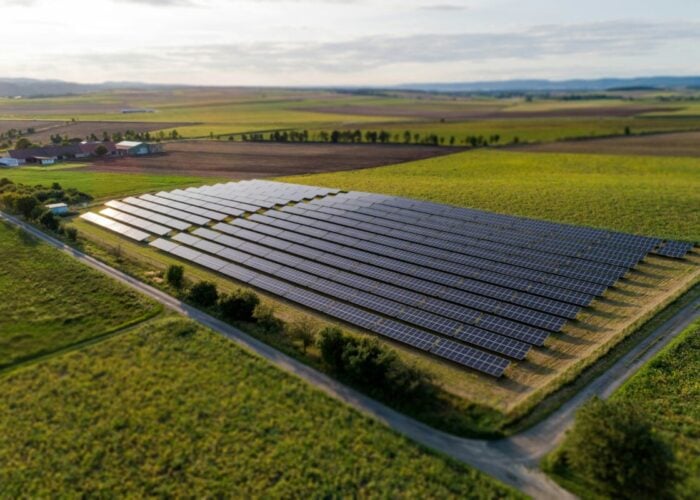REC Silicon is to expand polysilicon production at its Moses Lake facility and silane production at its Butte facility, while restarting Silane I production. The company is also undertaking a feasibility study to establish a 20,000MT joint venture polysilicon plant in Saudi Arabia with IDEA Polysilicon.
FBR and silane expansions
REC Silicon has said it would expand capacity at its Moses Lake facility by 3,000MT using its next generation fluid bed reactor (FBR-B) technology to make semiconductor-grade granular polysilicon. The company said the expansion would be completed and start operations in the third quarter of 2016.
Try Premium for just $1
- Full premium access for the first month at only $1
- Converts to an annual rate after 30 days unless cancelled
- Cancel anytime during the trial period
Premium Benefits
- Expert industry analysis and interviews
- Digital access to PV Tech Power journal
- Exclusive event discounts
Or get the full Premium subscription right away
Or continue reading this article for free
The company also said that it would restart 3,000MT of silane gas production at Silane I as well as expand silane production by 1,200MT at its facility in Butte. The restart of Silane I, which was idled last year, is expected in the first quarter of 2016.
Demand for silane was said to be robust, due to strong demand in PV and flat panel display markets. Silane is used as a feed gas for Siemens-based polysilicon production.
REC Silicon said the expansions would cost an estimated US$115 million.
Saudi Arabian JV
Continuing its new strategy of partnering on FBR-based polysilicon expansions to limit capital expenditure exposure, REC Silicon also said it had signed an agreement to investigate the possible development of a 20,000MT FBR plant using its FBR-B technology in Saudi Arabia with local polysilicon start-up producer, IDEA Polysilicon.
REC Silicon noted that the project development phase was expected to take 18 months and culminate in an investment decision some time in 2016. The company had proposed that it would hold a 25% equity interest in the proposed polysilicon plant.
Possible funding for the facility was said to be coming through a combination of equity and loans via the Saudi Industrial Development Fund and with commercial banks.
However, according to Johannes Bernreuter of polysilicon specialist market research firm, Bernreuter Research, IDEA Polysilicon had repeatedly postponed its original polysilicon production plans due to issues surrounding the selection of the plants construction bidders.
“As early as April 2010, IDEA International announced it would build a polysilicon plant in Saudi Arabia,” noted Bernreuter to PV Tech. “However, selection of one out of the four bidder consortia Schmid Silicon Technology/M+W Group, Centrotherm Sitec/Hanwha Engineering & Construction, GT Advanced Technologies/Samsung Engineering as well as Poly Plant Project/Chengda Engineering Corp. has repeatedly been postponed.”
“Obviously, IDEA has realised [that] it is not the right time to enter the polysilicon market now, with oversupply looming ahead. Second, a new entrant cannot make a dent against low-cost Chinese polysilicon producers with the established Siemens process, be it monosilane or trichlorosilane-based,” added Bernreuter, Hence, IDEA has possibly made a technology switch to fluidised bed reactor (FBR) through the liaison with REC Silicon.”
Bernreuter told PV Tech that he believed several uncertainties remained over the proposed project in Saudi Arabia.
“The Arabian Peninsula has not been a flourishing ground for polysilicon plants so far: the plants of Polysilicon Technology Co and Qatar Solar Technologies have significantly been delayed, UMG aspirant Silicor Materials has shied away from the location, and SunEdison seems to do so as well.”
Should the project be implemented, Bernreuter said it did not expect it to come on stream before 2019/2020.
China JV update
REC Silicon also said that it had recognised special items of US$101 million related to the sale of its silane based FBR-B technology to its previously announced joint venture in China with Shaanxi Non-Ferrous Tian Hong New Energy Co.
Tore Torvund, CEO of REC Silicon said: “I am pleased that our FBR technology is being recognised as the leading polysilicon manufacturing technology which has resulted in the announcement to expand our Moses Lake facility, the Yulin JV in China, and a potential expansion in Saudi Arabia.”
However, Bernreuter added: “REC Silicon still has to prove with its joint venture in China that both its FBR B technology will work in mass production and that a joint venture between western technology and mindset on the one side and local working and manufacturing culture on the other can be successful.”
Therefore the announcement of a small 3,000MT FBR B plant in the US could be regarded as the proving ground for both JVs and future JVs.
Financial results
REC Silicon reported third quarter 2014 revenue of US$126.5 million and EBITDA excluding special items from continuing operations of US$44.9 million and a total EBITDA of US$145.9 million.
Slightly lower polysilicon sales volumes were offset by record silane gas sales volumes and resulted in revenues broadly in line with the previous quarter.
The company noted that its debt has been reduced by US$55 million to US$228 million, primarily due to the repayment of an NOK 196 million bond.
The company reported profit from continuing operations of US$119.5 million in the third quarter, compared to US$24.6 million in the previous quarter, due primarily to higher EBITDA, special items, and positive net financial items, according to the company.






